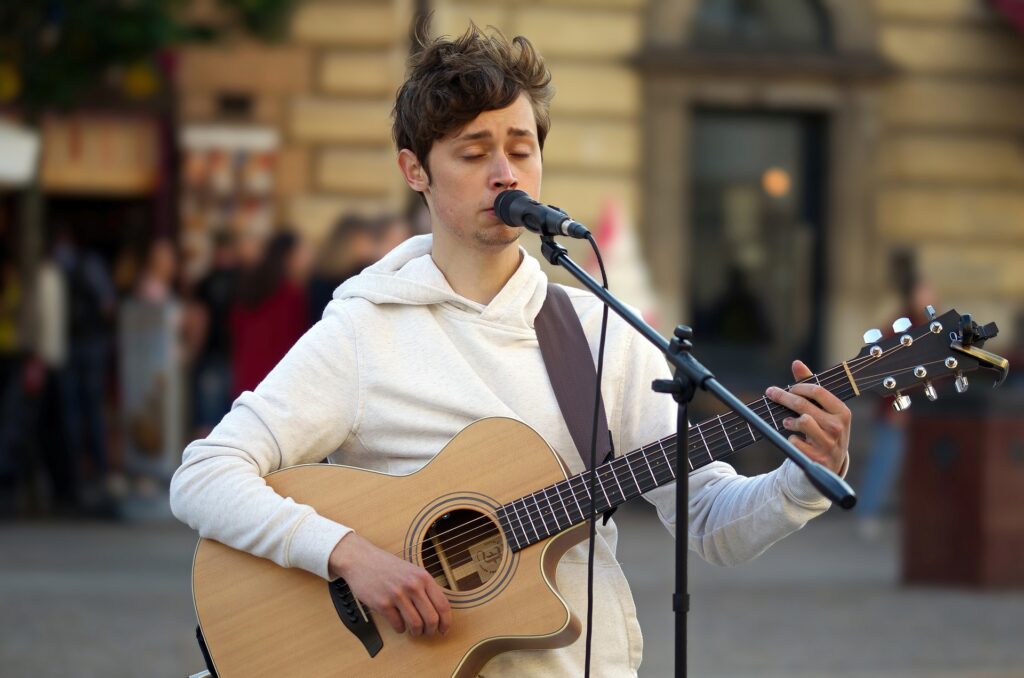
In-Home Singing Lessons
Singing is an excellent source of pleasure and fulfillment. Solo practice and Singing with others can provide a deep sense of satisfaction.
Music is great for social gatherings and family time. A creative alternative to Computer Games and TV Shows.
In-Home Singing lessons allow students to learn in a comfortable, private, low-stress environment. Parents love In-Home Singing lessons also! Say goodbye to traffic, gas prices, and waiting rooms with the convenience of Singing Lessons in your home.
Numerous studies available show children who play an instrument, score higher on both standard and spatial cognitive development tests alike. Singing stimulates multiple areas of the brain at the same time triggering endorphins and oxytocin that are known to stimulate feelings of trust and bonding while eliminating anxiety and depression. Singers have been observed to have lower levels of cortisol, indicating reduced stress levels
Singing is also a workout, your lungs will get a workout as you employ proper singing techniques and vocal projections. Other related health benefits of singing include a stronger diaphragm and stimulated overall circulation.
Learning to sing will allow you to listen to music with greater enjoyment and appreciation. As you learn how songs are put together, your listening ability will become more refined. Songs that you have been listening to for years will seem richer as you hear details that you have never noticed before.

What To Expect In Singing Lessons?
Unlike all other instruments, you cannot buy the voice of your choice.
The early stages of Singing lessons are spent establishing what your voice is now and how best to make use of what you have. There are standard skills that every singer should know relating to Breathing, Posture, Pitch and Music theory.
One of the very first tasks is to establish your current vocal range. With this information, we figure out what songs, singers, genres, keys, and bands are closest to what you were born with.
We then use these songs as a jumping off point to teach you about Breathing, Posture, Warmups, Diction, Scales, arrangements and Songwriting.
With training, you will extend your vocal range, improve your tone, learn how to communicate with other musicians and express yourself through music.
We teach many practical skills related to Singing including Singing while playing an instrument, Studio Recording, and Live Performance.
Your voice is a part of your body, singers need to look after their voice with Good Technique, Hydration and Rest.

Singing History
We have no recordings of prehistoric music, we can only imagine the melodies and the stories. Before sheet music and recording equipment songs were passed on from generation to generation by memory.
While the developed world considers singing to be mostly for entertainment, many cultures consider singing to be a vital part of social order and religion.
The European Renaissance lead by Italy from 1300-1680 had a tremendous effect on all music. This “Rebirth” of culture and logical thinking led to the standardization of written music and music instruction. Add to that the invention of the Printing Press by Johannes Gutenberg, around 1440 and the stage was set for musicians who had never met to share their music for generations. To this day we can see the Italian influence in written music by the use of Italian words like Tempo (Time), Crescendo (Swell Up) and Forte (Strong).
The Renaissance led to great advances in Science, Music, Painting, and Sculpture. The finest Singers and the finest Musicians played for the elite of society, the entertainment of choice became known as Opera. The word “Opera” means “Work” in Italian. This work is referring to a composition in which poetry, dance, and music are combined. Operas where a big deal, there would be grand stages set with lavish decorations, amazing customs, the best musicians and of course the best Singers. Opera singers needed to be loud enough to be heard over an orchestra and were required to deliver mind-blowing performances. Achieving this level of skill required singing teachers. Many of the terms and techniques used by modern singers come from Operatic Training, we still classify a Singers range using Italian words like Alto (High) and Soprano (Above).
Singing Fun Facts
When we sing, sound comes out of our mouths at about 75mph
There is no human culture, no matter how remote or isolated, that does not sing
While Elvis Presley recorded over 500 songs, its commonly believed he never wrote a song.
The world record for the longest non-stop Elvis impersonation is 55 hours.
The first Opera was performed 418 years ago. Opera is the oldest genre of music still popular today.
Singing releases endorphins, which make you feel instantly happier
When you Sing you also release Oxytocin, which is a natural stress reliever and is found to alleviate feelings of depression and loneliness.
Singing with other people intensifies these benefits.
Less then 2% of the human population is actually tone deaf. If you cringe when a performer sings a horribly flat or sharp note, then you are not tone deaf.
We are not alone, many animals sing including Toadfish, Mice, Bats, Whales, Squirrels, Frogs and Birds.
Popular Singers
- Ed Sheeran
- Elvis Presley
- Aretha Franklin
- Lady Gaga
- Rihanna
- Jack Johnson
- Axel Rose
- Sam Smith
- Michael Jackson
- Katy Perry
- Bing Crosby
- James Brown
- Justin Beiber
- Robert Plant
- Luciana Pavarotti
- Paul McCartney
- Johnny Cash
- Maria Carey
- Taylor Swift
- Bruce Springsteen
- Steve Perry
- Frank Sinatra
- Freddie Mercury
- Bruno Mars
- Adele

Are you ready to get started?
"*" indicates required fields
This site is protected by reCAPTCHA and the Google Privacy Policy and Terms of Service apply.




